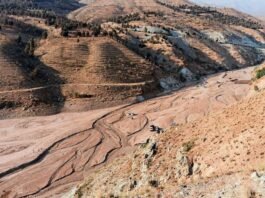Landmines and explosive remnants of war continue to pose a significant threat to the safety and well-being of communities worldwide. These hidden killers lurk beneath the surface, silently waiting to claim innocent lives and cause severe injuries. The International Day of Mine Awareness plays a crucial role in shedding light on this ongoing issue and mobilizing efforts to address it.
One of the primary objectives of this day is to raise awareness about the indiscriminate nature of landmines. Unlike conventional weapons, landmines do not distinguish between combatants and civilians, making them a particularly insidious weapon of war. They remain active long after conflicts have ended, posing a constant danger to civilians, especially in post-conflict areas.
Education is another key aspect of the International Day of Mine Awareness. By educating individuals and communities about the risks associated with landmines, we can empower them to take necessary precautions and avoid dangerous areas. Education also involves teaching people how to identify and report the presence of landmines, enabling authorities to take timely action and ensure the safety of affected populations.
The International Day of Mine Awareness also serves as a platform for advocating for stronger international cooperation and support in mine action. Efforts to clear landmines and explosive remnants of war require significant resources, expertise, and collaboration between governments, non-governmental organizations, and affected communities. By highlighting the importance of mine action, this day encourages countries to allocate necessary funds and resources to mine clearance and victim assistance programs.
Furthermore, the International Day of Mine Awareness plays a crucial role in advocating for the rights and needs of mine victims. Landmines not only cause immediate physical harm but also have long-lasting effects on individuals and communities. Survivors often face lifelong disabilities, trauma, and social exclusion. This day provides an opportunity to amplify the voices of mine victims, advocate for their rights, and promote inclusive societies that support their rehabilitation and reintegration.
In conclusion, the International Day of Mine Awareness is an essential annual event that draws attention to the devastating impact of landmines and explosive remnants of war. By raising awareness, educating communities, and advocating for stronger international cooperation, we can work towards a world free from the threat of mines, where individuals can live in safety and security.
The history of the International Day of Mine Awareness dates back to the early 1990s when the devastating impact of landmines on civilian populations became increasingly apparent. Landmines are explosive devices that are usually buried underground and are triggered by the presence, proximity, or contact of a person. They are indiscriminate weapons that do not differentiate between soldiers and civilians, causing immense harm and suffering.
During the 1990s, conflicts in countries such as Afghanistan, Cambodia, and Mozambique highlighted the urgent need to address the issue of landmines. These conflicts left behind millions of landmines that continued to pose a threat to communities long after the fighting had ended. The toll on civilians was particularly severe, with thousands of people losing their lives or suffering life-altering injuries.
In response to this humanitarian crisis, the international community began to take action. In 1992, the International Campaign to Ban Landmines (ICBL) was formed, bringing together non-governmental organizations, activists, and individuals who were dedicated to eliminating landmines. The ICBL played a crucial role in raising awareness about the issue and advocating for an international treaty to ban landmines.
After years of campaigning and diplomatic negotiations, the Ottawa Treaty, also known as the Mine Ban Treaty, was adopted in 1997. This landmark treaty prohibited the use, stockpiling, production, and transfer of anti-personnel landmines. It also established a framework for mine clearance, victim assistance, and international cooperation.
Building on the momentum generated by the Ottawa Treaty, the United Nations General Assembly declared April 4th as the International Day of Mine Awareness in 2005. This annual observance aims to educate the public about the dangers of landmines and promote efforts to clear contaminated areas, assist victims, and support mine risk education programs.
Since its establishment, the International Day of Mine Awareness has served as a platform for governments, organizations, and individuals to come together and advocate for change. It provides an opportunity to highlight the progress made in mine action and raise funds for mine clearance, victim assistance, and mine risk education initiatives.
On this day, various events and activities are organized around the world to raise awareness and mobilize support. These include mine risk education workshops, mine clearance demonstrations, exhibitions showcasing the impact of landmines, and campaigns to advocate for the rights of landmine survivors.
The International Day of Mine Awareness is a reminder of the ongoing challenges posed by landmines and the need for sustained efforts to eliminate them. It underscores the importance of international cooperation, political will, and financial resources in achieving a world free from the threat of landmines.
Moreover, the psychological impact of landmines cannot be underestimated. The constant fear of stepping on a hidden mine creates a climate of anxiety and stress in affected communities. People are afraid to leave their homes or venture into areas that have not been cleared of mines, severely limiting their freedom of movement and their ability to engage in normal daily activities. This psychological trauma can have long-lasting effects on individuals and their mental well-being.
The socio-economic consequences of landmines are also significant. Landmines render large areas of land unusable for agriculture, preventing communities from cultivating crops and sustaining themselves. This leads to food insecurity and dependency on external aid. Additionally, the presence of landmines hampers the reconstruction and development efforts in post-conflict areas, as it poses a constant threat to the safety of construction workers and hinders the rebuilding of infrastructure.
Furthermore, the economic impact of landmines extends beyond the immediate aftermath of a conflict. The presence of landmines deters foreign investment, as companies are reluctant to operate in areas where their employees’ safety cannot be guaranteed. This lack of investment further hinders economic growth and perpetuates the cycle of poverty in affected communities.
In conclusion, landmines have far-reaching consequences that extend beyond physical injuries. The psychological and socio-economic effects of landmines create a vicious cycle of fear, poverty, and dependency. Efforts to clear landmines and provide support to affected communities are crucial in order to mitigate the impact of these indiscriminate weapons and promote peace, stability, and development.
The Efforts to Eliminate Landmines
Despite the challenges, significant progress has been made in the global effort to eliminate landmines. The Mine Ban Treaty, also known as the Ottawa Treaty, was adopted in 1997 and has been ratified by 164 countries. This treaty prohibits the use, production, stockpiling, and transfer of anti-personnel mines. It serves as a crucial legal framework for countries to commit to the eradication of landmines and to address the devastating impact they have on civilian populations.
However, the process of clearing landmines and ensuring the safety of affected communities is an extensive and complex endeavor that requires the collaboration of various organizations and initiatives. One such organization is the International Campaign to Ban Landmines (ICBL), a global network of non-governmental organizations (NGOs) that advocates for the eradication of landmines and works towards the implementation of the Mine Ban Treaty.
The ICBL actively engages in mine clearance operations, victim assistance programs, and advocacy for stronger policies and funding. Mine clearance operations involve the painstaking task of physically locating and removing landmines from affected areas. This process requires highly skilled demining teams equipped with specialized tools and techniques to ensure the safe removal of landmines without causing harm to themselves or the surrounding environment.
Victim assistance programs play a crucial role in supporting individuals and communities affected by landmines. These programs provide medical care, physical rehabilitation, psychological support, and socioeconomic reintegration for landmine survivors. They also focus on raising awareness about the risks associated with landmines and educating communities on how to avoid accidents and injuries.
In addition to on-the-ground efforts, advocacy plays a vital role in the global movement to eliminate landmines. Organizations like the ICBL work tirelessly to raise awareness about the devastating impact of landmines and advocate for stronger policies and funding from governments and international bodies. They engage in diplomatic efforts, conduct research, and collaborate with other stakeholders to ensure that landmine issues remain high on the international agenda.
Despite the progress made, the eradication of landmines remains a daunting task. Many countries still face significant challenges in clearing their territories of landmines, especially in post-conflict regions where the presence of these hidden explosives continues to pose a threat to civilian safety. Additionally, the long-term impact of landmines on affected communities, such as the loss of agricultural land and displacement of populations, requires sustained support and resources to address.
In conclusion, the global efforts to eliminate landmines have made significant strides, but the work is far from over. Through international treaties, organizations, and initiatives, progress has been made in reducing the use and stockpiling of landmines. However, continued collaboration, funding, and political commitment are essential to ensure the safe removal of landmines, provide support to affected communities, and ultimately create a world free from the devastating impact of landmines.
How You Can Get Involved
There are several ways you can contribute to the cause and make a difference on the International Day of Mine Awareness:
- Raise Awareness: Share information about the impact of landmines on your social media platforms. Use the hashtag #MineAwarenessDay to join the global conversation. By sharing stories of survivors, statistics on the number of landmine casualties, and the long-term effects on affected communities, you can help educate others and encourage them to take action.
- Support Organizations: Donate to organizations that are actively involved in mine clearance, victim assistance, and advocacy. Your contribution can help save lives and support affected communities. Organizations like the International Campaign to Ban Landmines (ICBL) and the Halo Trust work tirelessly to remove landmines and provide aid to survivors. Your financial support can help them continue their important work.
- Get Educated: Learn more about the issue of landmines and the efforts being made to eliminate them. Knowledge is power, and by understanding the problem, you can become a more effective advocate for change. Read books and articles, watch documentaries, and attend webinars or conferences to deepen your understanding of the issue. Educate yourself on the international treaties and conventions that aim to ban landmines and hold governments accountable for their use.
- Engage with Local Communities: Reach out to local organizations and communities that are affected by landmines. Offer your support, volunteer your time, or participate in events and initiatives aimed at raising awareness. By directly engaging with affected communities, you can gain firsthand insights into their struggles and needs. This will allow you to tailor your advocacy efforts and support to address their specific challenges.
- Advocate for Change: Write to your local representatives, urging them to support policies and funding that prioritize mine clearance and victim assistance. Your voice can make a difference in shaping government priorities. Attend town hall meetings, contact your elected officials, and join advocacy campaigns to amplify your message. By working collectively with other advocates, you can exert greater pressure on policymakers and drive meaningful change.
Remember, the fight against landmines requires a multi-faceted approach. By raising awareness, supporting organizations, educating yourself, engaging with local communities, and advocating for change, you can play a vital role in creating a world free from the devastating impact of landmines.




